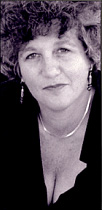 Welcome to my home, my home on the web. This is a new home for me, one that I am entering in my 60th year. For now my home will be patterned on my upper West Side apartment, the apartment that was the home of the Lesbian Herstory Archives for over twenty years. Once a month we would have an “At-Home with the Archives” where lesbian cultural workers would present their slide shows or films or songs or poems to groups that ranged from ten to a hundred and fifty. For all the years the archives shared my apartment, my home was a public place as this home will be. I welcome you into my dining room, my living room, my bedroom, which is also my study, and a place that only exists here, my garden.
Welcome to my home, my home on the web. This is a new home for me, one that I am entering in my 60th year. For now my home will be patterned on my upper West Side apartment, the apartment that was the home of the Lesbian Herstory Archives for over twenty years. Once a month we would have an “At-Home with the Archives” where lesbian cultural workers would present their slide shows or films or songs or poems to groups that ranged from ten to a hundred and fifty. For all the years the archives shared my apartment, my home was a public place as this home will be. I welcome you into my dining room, my living room, my bedroom, which is also my study, and a place that only exists here, my garden.
I thought as a way to get to know each other, I would share with you the introductions I have written for two collections of writings, A Restricted Country, published in 1987 by Firebrand Books, and A Fragile Union, published in 1998 by Cleis Press. And now just the bare facts: born in the Bronx, NYC in 1940 to a widowed Jewish mother, came out as a fem in the working class bars of Greenwich Village in the late 1950s, protested the HUAC [House Un-American Activities Committee], the Vietnam War, marched against nuclear war, segregation, apartheid, US involvement in Central America, demonstrated for women's rights including abortion and Gay Liberation. In 1973 became co-founder of the Lesbian Herstory Archives, in 1979 started writing erotic stories and in 1982 ran afoul of the anti-pornography movement, thus becoming a fervent pro-sex activist in the “Sex Wars.” In 1966 I started teaching writing in the SEEK Program at Queens College and did not stop until cancer forced me to retire in 1995.
Please continue on to:
- Preface to A Restricted Country (1987)
- Introduction to British New Edition of A Restricted Country (1996)
- Introduction to A Fragile Union (1998)
June 8, 2000
I have just returned home, after an afternoon spent demonstrating in the streets with the women of the international lesbian caucus at the women’s gathering at the United Nations. Frantically, these women and their supporters are trying to save the forward-looking demands and agreements that came out of the Beijing conference five years ago. Right-wing groups from many countries are accusing these women of forcing a gay rights and abortion agenda on their countries. My Australian lover and I stood in the square facing the United Nations surrounded by women from all over the world, many wearing the iridescent rainbow flags signaling their support for the concept that human rights include the freedom of sexual preference. Women from Guatemala, Mexico, India, Korea, Thailand, South Africa, Canada, indigenous women from many countries, the United States, France, England, Australia, Costa Rica, Sri Lanka, Holland, Poland, Yugoslavia and more, more, calling out their refusal to go back on the Beijing promises, their refusal to allow governments to barter away their hope.
I stood among them, so moved by this international face of lesbianism, once again in the midst of a historical moment when women’s desire, so often a secret thing, was shaping new air. I have been on such a journey—
We are holding to the promise of the Beijing Platform for Action. We, who have been dispossessed of our human rights, stand in solidarity with the dispossessed. Lesbians come from every region, every country, every religion, every culture, every race, every age group, every class, every part of society. We are citizens of the world. We demand that governments recognize our human rights. We demand that the United Nations guarantee them, as they are bound to do by the Universal Declaration of Human Rights.
from “An Open Letter from the Lesbian Caucus
to the UN General Assembly, Government Delegates, Representatives from Non-Governmental Organizations and the Media”